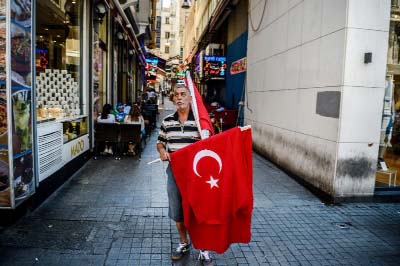
AFP, Istanbul :
For centuries, it has been the main commercial artery running through the heart of Istanbul, attracting thousands of people every day for shopping, entertainment or historic sightseeing.
But following a string of deadly attacks and the failed coup of July 15, Istiklal Avenue now faces an uncertain future, its shops boarded up and visitor numbers plummeting, its identity rapidly changing.
Located in Beyoglu in the centre of European Istanbul, the pedestrianised street is lined with elegant shops and cafes, stretching 1.5 kilometres (almost a mile) from Tunel, which overlooks the Golden Horn, to Taksim Square.
In March, the street was hit by a suicide bombing that killed three Israelis and an Iranian and injured dozens in an attack blamed on Islamic State (IS) jihadists. And three months later, at least 41 people were killed in a triple suicide bombing at Ataturk airport, causing tourism to plummet.
Now, once-lively areas along the street have fallen silent, with a string of shops shuttered, from big chains to boutiques, unable to make a profit in the face of high rents and declining revenues.
For Beyoglu mayor Ahmet Misbah Demircan, Istiklal Avenue will never lose its dynamism, with the current recession an unfortunate “reality” but only a temporary one.
“The terror attacks followed by the July 15 coup were actions aimed at dealing a setback to Turkey’s economy,” he told AFP.
“We are aware of the negative waves. It’s only natural after all that has happened, and I personally do not see any sign it will have permanent repercussions,” said Demircan, a member of the ruling Justice and Development Party (AKP).
Although some businesses would not survive because of the lack of profits, it would be unfair to stigmatise Istiklal Avenue and craft “disaster scenarios” out of it, he said.
Istiklal Avenue has a special place in the history of Istanbul and until the collapse of the Ottoman Empire, was the heart of what seen as very much the European quarter of the city.
Then known as the Grande Rue de Pera-The Great Street of Pera-it formed the main axis of an area that at the time was populated almost exclusively by Europeans and Christians and not Ottoman Muslims.
For centuries, it was a hub for foreign merchants, diplomats and later tourists in Istanbul-then known as Constantinople-resulting in the construction of churches and embassy complexes that remain to this day.
For centuries, it has been the main commercial artery running through the heart of Istanbul, attracting thousands of people every day for shopping, entertainment or historic sightseeing.
But following a string of deadly attacks and the failed coup of July 15, Istiklal Avenue now faces an uncertain future, its shops boarded up and visitor numbers plummeting, its identity rapidly changing.
Located in Beyoglu in the centre of European Istanbul, the pedestrianised street is lined with elegant shops and cafes, stretching 1.5 kilometres (almost a mile) from Tunel, which overlooks the Golden Horn, to Taksim Square.
In March, the street was hit by a suicide bombing that killed three Israelis and an Iranian and injured dozens in an attack blamed on Islamic State (IS) jihadists. And three months later, at least 41 people were killed in a triple suicide bombing at Ataturk airport, causing tourism to plummet.
Now, once-lively areas along the street have fallen silent, with a string of shops shuttered, from big chains to boutiques, unable to make a profit in the face of high rents and declining revenues.
For Beyoglu mayor Ahmet Misbah Demircan, Istiklal Avenue will never lose its dynamism, with the current recession an unfortunate “reality” but only a temporary one.
“The terror attacks followed by the July 15 coup were actions aimed at dealing a setback to Turkey’s economy,” he told AFP.
“We are aware of the negative waves. It’s only natural after all that has happened, and I personally do not see any sign it will have permanent repercussions,” said Demircan, a member of the ruling Justice and Development Party (AKP).
Although some businesses would not survive because of the lack of profits, it would be unfair to stigmatise Istiklal Avenue and craft “disaster scenarios” out of it, he said.
Istiklal Avenue has a special place in the history of Istanbul and until the collapse of the Ottoman Empire, was the heart of what seen as very much the European quarter of the city.
Then known as the Grande Rue de Pera-The Great Street of Pera-it formed the main axis of an area that at the time was populated almost exclusively by Europeans and Christians and not Ottoman Muslims.
For centuries, it was a hub for foreign merchants, diplomats and later tourists in Istanbul-then known as Constantinople-resulting in the construction of churches and embassy complexes that remain to this day.

